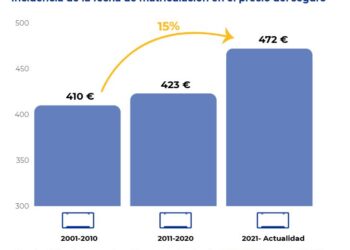 (A partir de la historia de ciencia –ficción de Douglas Adams, The Hitchhiker´s Guide to the Galaxy, nuestro amigo Nick Davenport hace una mordaz crítica de Bruselas y su capacidad para generar gasto improductivo en lugar de reducir estructura y dedicar las energías a plantear escenarios más ligeros propicios a que la iniciativa privada cree puestos de trabajo tan necesarios en una Europa con alta tasa de desempleo. Sus tesis liberales le llevan a anhelar aquella época de Margaret Thatcher donde el PIB gastado por el Estado llegó al 39% frente al 58% de Francia actualmente. Así mismo pone en cuestión el despilfarro de gastos innecesarios para implantar solvencia II, una vez más retrasada la fecha de aplicación cuando se podía seguir funcionando con Solvencia I. En este blog se pueden expresar todas las opiniones lo cual no quiere decir que sean necesariamente compartidas por el equipo editorial. En cualquier caso bueno es conocer las razones de los británicos a su desapego cada vez más creciente a la Unión Europea.)
(A partir de la historia de ciencia –ficción de Douglas Adams, The Hitchhiker´s Guide to the Galaxy, nuestro amigo Nick Davenport hace una mordaz crítica de Bruselas y su capacidad para generar gasto improductivo en lugar de reducir estructura y dedicar las energías a plantear escenarios más ligeros propicios a que la iniciativa privada cree puestos de trabajo tan necesarios en una Europa con alta tasa de desempleo. Sus tesis liberales le llevan a anhelar aquella época de Margaret Thatcher donde el PIB gastado por el Estado llegó al 39% frente al 58% de Francia actualmente. Así mismo pone en cuestión el despilfarro de gastos innecesarios para implantar solvencia II, una vez más retrasada la fecha de aplicación cuando se podía seguir funcionando con Solvencia I. En este blog se pueden expresar todas las opiniones lo cual no quiere decir que sean necesariamente compartidas por el equipo editorial. En cualquier caso bueno es conocer las razones de los británicos a su desapego cada vez más creciente a la Unión Europea.)
Escribe: Nick Davenport
For those of us who have read Douglas Adams’ famous book “The Hitchhiker’s Guide to the Galaxy” 42 is a highly significant number. The book has inspired the name – 42 – given to a new high-tech building in Paris designed to house a private school for elite computer programmers. This school will accept 1000 students. Already 50 000 have applied. It is an unusual example of forward-looking decision-making emerging from the France of Francois Hollande, “le Président Normal” – no doubt because it is a private, and not a governmental initiative.
In Adams’ book, a group of hyper-intelligent pan-dimensional beings design a computer, known as Deep Thought, to tell them “The Answer to Life, the Universe and Everything”. After 7½ million years of deliberation – to an excited and expectant audience – the computer spits out the Answer: 42.
The audience is mystified. The computer explains that the problem was not in giving the Ultimate Answer, but in designing the Ultimate Question. Another larger computer needs to be designed to phrase the Ultimate Question, which will take another 10 million years to compute.
10 million years later, The Ultimate Question turned out to be the Planet Earth. But 5 minutes before the computer was due to announce this, the Earth was destroyed by a race called the Vogons on the grounds that it was in the path of a pan-galactic Super Highway. In reality however the Vogons had been hired by a group of psychiatrists fearing for the loss of their careers if the Question became known.
42 has another significance in today’s France. France is the country in the EU with the highest proportion of its GDP spent by the state: 58%. Thus 42% of privately-owned production has to finance the spending of the state, or would do if the state’s budget was balanced, which of course it is not. The private sector is further handicapped by the highest taxes on employment in the EU.
Recent retrospectives of Margaret Thatcher’s life remind us that she got the proportion of GDP spent by the state down to 39%. As a result the UK went from being the poor man of Europe to having its most flourishing economy in less than 5 years. The answer to recovering Europe’s competitive position is clear: member states (and Brussels) must spend less as a proportion of GDP, and allow the private sector to produce.
To anyone who has been involved with implementation of capital calculation for insurance companies under the new Solvency 2 regime, the parallel with Douglas Adam’s fictional computer will be immediately apparent. Vast amounts of time and money have been spent by Europe’s insurers to implement computer systems measuring risk of every type according to every actuarial parameter. At the end of it all, the system is supposed to spit out a number which represents the absolutely correct amount of capital required to be held by that insurer. The number is most likely to be startlingly similar to that in use under the previous much cheaper system, Solvency 1. If it isn’t, it can be adjusted retrospectively to make it look right. And the “psychiatrists” are still at work, since the methodology, already applied by most European insurers, does not suit the German Life insurers and therefore needs to be redesigned. Confusion reigns and will do for another 2 years at least. Billions of euros spent in the hope of giving comparability have so far produced the opposite effect and may well prove to have been wasted.
Margaret Thatcher, the archetypal British housewife, would have hated that. Much of the present British disillusion with today’s Europe comes from the same impression, widely held: Brussels is wasting taxpayers’ money on schemes which are either unnecessary or don’t work and forcing national governments to accept projects which are inappropriate, intrusive or out of date. Social models, like the French one, with ever-shortening working hours and ever-increasing social protection, no longer work. European institutions still see their key role as Consumer Protection, long after the cost of that has made European business uncompetitive. We fear for Europe, and particularly for France, which cannot go backwards without violent political reaction.
In the meantime, the real and pressing issues of unemployment, economic recovery and long-term reductions in wasteful state spending are not addressed. Business people, in France, Spain and the UK know this. In the UK they long for a free hand, unfettered by wasteful regulation from Brussels, and for Europe to realise its enormous potential as an open market competitive on the world stage.






